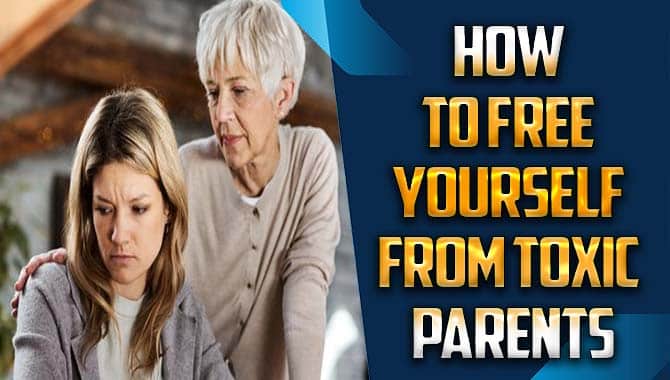Parents are the foundation of our lives. They are the first people we connect with, and they set the tone for our relationships with others. If we can establish healthy relationships with our parents.
We’ll be well on our way to rewarding, fulfilling adult relationships and a sense of belonging. But if those relationships are toxic. We can feel disconnected from ourselves and others and often struggle to form healthy bonds in adulthood.
Toxic families can greatly impact our mental health, self-esteem, relationships, work satisfaction, physical health, and behavior and decision-making abilities. And toxic family members can also negatively influence society at large—from the health of our population to social cohesion and economic stability.
Fortunately, toxic families do not have to define us as adults. However, toxic family dynamics can prevent ensuring a more satisfying future. We will discuss how toxic family dynamics manifest themselves in children and some ways parents can free their minds from toxic influences so that their children aren’t affected by them too much.

10 Quick Steps To Free Yourself From Toxic Parents

If you’re struggling with toxic parents, it’s crucial to recognize the signs of being with them. Cut off all communication with your toxic parents, including avoiding them when possible and speaking up for yourself if necessary.
Consider seeking professional help to free yourself from your parents’ influence and set boundaries around how you want to treat. Remember that you are not alone in this struggle; some people will support you. Do not give up on yourself – you can overcome anything. Here are 10 steps to free yourself from toxic parents:
1.Stop Trying To Please Them.

Trying to please your toxic parents can be a struggle. They may constantly pressure you to live up to their expectations, making it feel like you’re never good enough. Instead of focusing on what your toxic parent wants from you, focus on what you want for yourself.
Let go of your guilt for not living up to their standards and start living in your skin. It’s important to set boundaries with them and stick to them even if it makes them angry. By being honest with yourself and telling your toxic parent how you feel. You can begin the process of healing and move forward healthily.
2.Set And Enforce Boundaries.

It can be hard to set boundaries with toxic parents, but it’s crucial to do everything in your power to protect yourself. It’s important to set clear rules and expectations for yourself and stick to them no matter what.
Toxic parents will often try to guilt or manipulate you into changing your mind about leaving. Instead, stand your ground and refuse to give in to their requests. If they continue pushing you to stay despite your wishes, it may be time to consider taking some action. Whether getting legal support or moving out on your own, toxic parenting must end if you want to free yourself from toxic behavior.
3.Don’t Try To Change Them.
Trying to change toxic parents will only make things worse. Instead, focus on establishing healthy boundaries with your parents. Create a support system of friends and family who can help you navigate difficult relationships. It may take some time, but eventually, you can free yourself from toxic parenting. Remember, it is never too late to free yourself from toxic relationships and establish healthy boundaries in your life.
4.Be Mindful Of What You Share With Them.

It’s important to be mindful of what you share with your toxic parents. For instance, you must be careful about your online post and share them with them. This could include social media accounts, photos, or other personal information. Additional ways to protect yourself from sharing personal information with your toxic parents include keeping a journal of your interactions and reflecting on the impact of those interactions.
Additionally, limit the time you spend talking to them on the phone or in person. By taking these simple steps, you can free yourself from a toxic parent relationship and move on with your life. It is important to keep a journal of all your interactions with your toxic parent and reflect on the impact of those interactions.
5.Know Your Parents’ Limitations And Work Around Them — But Only If You Want To.

Knowing your parents’ limitations and working around them is important to free yourself from toxic parents. However, if you choose to do so, remember that it is only fair-minded if you can accept your parents’ limitations and do whatever you can within those boundaries.
It’s also important to remember that toxic behavior from your parents doesn’t just come from them but from their insecurities. If you can work around their limitations, do so; but if not, remember that they may not be able to accept your decision. So there are 10 quick steps to free yourself from toxic parents and build a healthy relationship with them.
6.Always Have An Exit Strategy.
If you find that living with your toxic parents is becoming too much, it’s important to have a plan for getting out. This can range from simply telling them that you need to move out to creating a timeline for when you think you’ll be ready. Make sure you have a reliable source of transportation, enough money to cover your expenses, and a friend or family member who can help you get through the transition.
Once you’ve decided to leave, don’t hesitate to take action. Create a timeline for when you think you’ll be ready, and stick to it. Remember, it may take time and patience for things to get better. So be realistic about your expectations, and don’t expect everything to be perfect the first time.
7.Don’t Try To Reason With Them.
Trying to reason with a toxic parent will only result in frustration and anger. Instead, it’s best to ignore them or distance yourself from them. If that doesn’t work, consider leaving home and finding a place where you feel safe and supported. It can be hard to break away from the toxic relationship, but remember – it isn’t your fault; toxic parents raised you.
There is support for you if you are willing to look for it, which will help you through this difficult period. Remember, toxic relationships are never easy, but with the right support system, you can overcome this challenge and move forward with your life.
8.You Don’t Have To Be At Your Parents’ Beck And Call.
Toxic relationships can be extremely harmful and frustrating. However, it’s not impossible to break free of toxic parents – you just need to know how and where to find help. Services available can provide support for both you and your parent(s), regardless of their toxicity. So don’t hesitate – to get the help you need to start healing from this abusive relationship.
Toxic parents often control their children through fear and intimidation. This can prevent their children from asserting their independence and making healthy decisions. It can also make forming normal relationships with peers and adults difficult.
The best way to free yourself from toxic parents is to recognize that you’re not alone. Millions of other kids are struggling with toxic parents. Talking about your experiences can help relieve some of the pain and stress.
9.You Don’t Have To Spend The Holidays With Your Parents.

There are many other ways to celebrate if you don’t want to spend the holidays with your toxic parents. You may choose to spend the holidays with family or friends instead. It’s also OK to celebrate without spending time with your toxic parents. Instead of going home for the holiday dinner, you can spend it at a restaurant or restaurant-style dinner. Or you can simply stay in and enjoy Christmas Day together as a family.
10.Take Care Of Yourself.
It is vital to take care of yourself to free yourself from toxic parental influence. Self-care includes setting boundaries, exploring your interests, and communicating your needs and desires honestly and openly. Toxic parents often try to control their children by withholding love or approval.
By taking care of yourself, you can resist the pressure to conform and express who you are. Steps such as these help you stand up for your independence and dignity.
If you have been under the influence of toxic parents for a long time, it may take time to fully recover from their influence. However, with patience and perseverance, you can free yourself from their toxicity and find happiness and fulfillment as an adult. Whether you are a child trying to escape a toxic family or an adult looking to heal from past relationships, steps such as self-care can help you break free from the chains of family dysfunction.
Signs Of A Toxic Parent

Abusive Behavior: Toxic parents are often abusive towards their children. They may use physical, emotional, or sexual abuse to get their way.
Manipulative Behavior: Toxic parents manipulate their children to get what they want. They may deny their children the affection and attention they deserve, use guilt or shame to get them to do things the way they want or use frustration or anger as punishment.
Unfair Expectations: Toxic parents set unrealistic standards for their children and often resent them when they are not met.
Lack Of Communication: Toxic parents are often unresponsive or hostile towards their children and fail to communicate effectively with them. This can lead to feelings of abandonment and foster unhealthy relationships. The signs of a toxic parent are varied and obvious, so parents need to be aware of them and prevent toxic relationships from developing in the first place.
Tips For Preventing Toxic Relationships In Future
If you’re dealing with toxic relationships, it’s important to learn how to recognize and avoid toxic people. Here are a few tips to help you do that.
- Learn To Trust Your Intuition: When it comes to relationships, trusting your gut is essential. Try paying attention to the subtle signs that point towards a potentially toxic relationship, such as constant criticism or arguing, minimizing your achievements, or making you feel guilty for your desires and needs. Paying attention to these signs can help you recognize when a relationship is becoming toxic before it becomes too difficult to break free.
- Set Boundaries With Your Parents And Communicate Clearly What You Want From Them: Setting boundaries is an important part of healthy relationships and can be vital in preventing toxic relationships from developing. Communicate clearly with your parents about what you want and don’t want regarding relationship boundaries and expectations, and make sure they understand these as well. It will go a long way in building trust between you and helping prevent toxic relationships from taking hold.
- Don’t Let Them Control Your Life Or Decisions: When we allow others to control our lives without voicing our own opinions or ideas, we risk falling into a toxic relationship where the other person tries to get their way at the expense of our happiness and well-being. It is vital to assert yourself whenever necessary and stand up for yourself and your views, even if this makes others upset or angry.
- Stay Positive And Focus On Your Own Goals: Avoid being drawn into arguments or disagreements with others, no matter how frustrating or difficult they may become, as this will only amplify a toxic relationship’s negative effects. Instead, try to maintain a positive attitude and focus on your goals and ambitions.
Conclusion
Stepmom shaming is a form of criticism in which stepmothers, stepdads, and nonbiological mothers in family systems shame their stepchildren by questioning the parenting abilities and competency of the biological mother. This could take several forms, such as “you don’t look like your father,” “you must have done something wrong to cause this,” or “I knew you would be a bad parent.
” While stepchildren often criticize stepmothers for being bad parents, research shows that stepmoms are often treated with hostility by children because of their new role in the family. Stepmoms sometimes feel isolated from their biological families and may experience shame about their new roles.
There is nothing wrong with being close to your parents as long as you can set boundaries and boundaries for them. You may not always be able to set boundaries with your parents, but you must learn how to set boundaries with them.
And remember, toxic relationships will not go away overnight; it takes time, effort, and commitment to change them. But the first step is understanding that they exist and accepting the fact that there is a problem. If you accept this first step, you can move forward in taking other steps toward creating a better family dynamic and relationship.
Frequently Asked Questions:
1.What Are The Signs Of Toxic Parents?
Some signs that a parent may be toxic include: constantly criticizing, never listening, being overly controlling, and making life difficult for their children. If you feel overwhelmed and uncomfortable in your home, it may be time to seek help.
2.How Do I Emotionally Detach From My Parents?
There can be many reasons why we emotionally attach to our parents. Some reasons might include feeling close to them because of their positive role in our upbringing, being grateful for the guidance and support they have given us, or simply wanting them to like us.
3.Is It OK To Disown Toxic Parents?
It is often difficult to break free from toxic parents, but it is important to remember that you are not alone. Many resources are available to help you, including books, articles, counseling, and support groups. It may take time and effort, but eventually, you can free yourself.
4.How Do I Heal Myself From A Toxic Mother?
- To heal yourself from a toxic mother, start by acknowledging that you are in pain.
- Next, take some time for self-care. This means spending time alone and healing your mind and body.
- Lastly, communicate with your mother to heal the relationship.
5.Why Do Some People With Toxic Parents Grow Up To Be Successful And Happy While Others Don’t?
It varies from person to person. However, some possible reasons why some people with toxic parents grow up to be successful and happy include: they develop a thicker skin, they learn how to self-soothe, they learn how to manage stress, or they simply don’t let their toxic parents get to them.

Leave a Reply